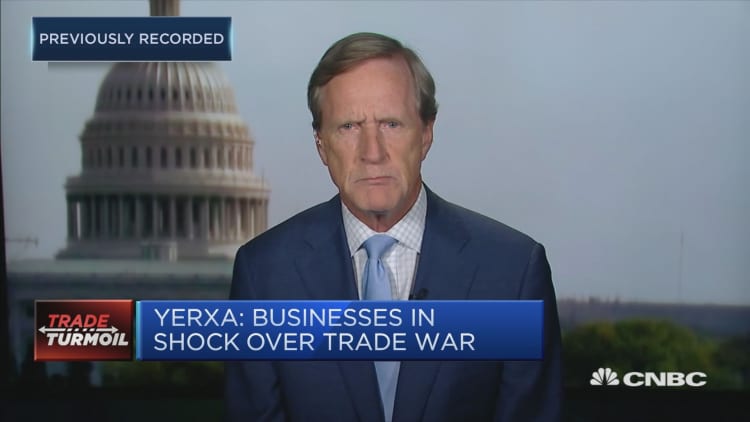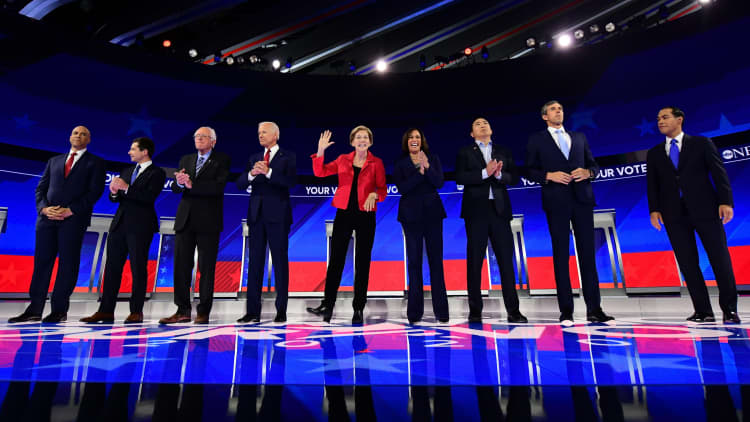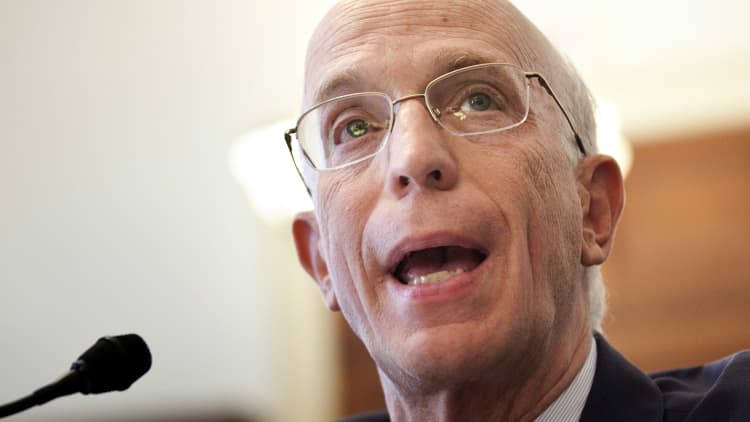The cacophonous opening of the 2020 presidential campaign has clarified one thing: free trade is now politically homeless.
That's remarkable, since Americans plainly recognize the benefits of trade expansion in an era of global economic integration. In last month's NBC News/Wall Street Journal poll, 64% called free trade "good for America."
But a self-styled "tariff man" Republican president and Democratic rivals promising their own versions of trade confrontation have turned away from it. That inverts the bipartisan support behind trade expansion deals from Ronald Reagan's presidency through Barack Obama's.
"The new bipartisanship is opposition to free trade," says Richard Haass, who advised past Republican presidents and now runs the Council on Foreign Relations. "It will be extraordinarily hard to resurrect a consensus that could pass a trade bill."

Economic analysis shows that international commerce benefits most Americans even as it imposes concentrated costs on a smaller number in domestic industries most adversely affected. Yet trade deals have come to symbolize global forces shaking middle America through widening income inequality and demographic change.
Never mind that globalization would have occurred without them, or that automation erodes manufacturing employment more – the unpopular government officials and business leaders involved in trade deals provide irresistible targets. And the first chapter of the 2020 contest suggests that won't change soon.
As he seeks reelection, President Donald Trump pursues a tariff war rattling financial markets and executive suites. On trade and immigration, a modern GOP dependent on working-class white voters embraces populism over business-friendly free-market conservatism.
Democrats attract swelling numbers of affluent, college-educated voters thriving in the global economy. Flipping an earlier generation's pattern, the party's rank-and-file now embraces free trade more fervently than Republicans do.
But that hasn't generated support for trade expansion among presidential candidates. Upscale Democrats tend to rally behind the party's tolerance on social issues, while traditional allies in organized labor target trade agreements such as the Trans-Pacific Partnership that President Barack Obama negotiated and that Trump scuttled.
"It's tough to break from the sense of history," says Mark Muro, a Brookings Institution scholar who has documented the new economic profile of Democratic constituencies.
Thus 2020 Democrats rip Trump for a clumsy and haphazard approach without rejecting trade confrontation itself.

A divided Congress may yet approve the revised North American Free Trade Agreement that Trump crafted with Canada and Mexico. Success depends mostly on fears of disruption to existing economic relationships.
But the old paradigm of bipartisan majorities combining most Republican lawmakers with a minority of Democrats appears dead. Haass says presidents seeking lower trade barriers may turn toward arrangements not requiring congressional approval.
Answering Trump's raw protectionism, Democrats suggest a new paradigm reshaped toward their priorities on workers' rights and the environment. "A new progressive agenda on trade is going to require a very different policy frame," says Gene Sperling, an economic adviser to presidents Obama and Bill Clinton.
Rising 2020 candidate Elizabeth Warren has proposed one. It conditions future deals on labor, environmental, taxation and human rights standards so strict that the U.S. itself doesn't meet them.
That sounds like a plan for no deals at all. Even a more tempered version wouldn't yield much different results, says Democratic trade expert Jennifer Hillman, since the U.S. would resist subjecting its domestic policies to international negotiations as much as counter-parties would.
Hillman, a former Clinton trade official who teaches at Georgetown Law School, says critics of modern trade deals ask them to do too much. The best way to help casualties of economic change, she argues, is much larger government investments in education, job training, and safety-net programs.
But that has not proven politically feasible. So in 2016, having called TPP the "gold standard" as Obama's secretary of State, Hillary Clinton opposed it as the Democratic presidential nominee.
In a recent debate, Joe Biden insisted that "you need to organize the world to take on China" rather than go it alone like Trump. But like leading rivals, even Obama's loyal vice president won't embrace Obama's attempt to do exactly that through TPP.
Hillman believes Clinton and Biden both hold different private views, but bent to prevailing political winds.
"I'm just disappointed," she concludes, "that they're buying into the notion that you can't sell the truth to the American people."
WATCH: US missed best chance to do something about China by pulling out of TPP, says Blinder



